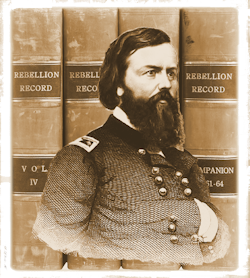FEBRUARY 8TH to 20TH.—Such astounding events have occurred since the 8th instant, such an excitement has prevailed, and so incessant have been my duties, that I have not kept a regular journal. I give a running account of them.
Roanoke has fallen before superior numbers, although we had 15,000 idle troops at Norfolk within hearing of the battle. The government would not interfere, and Gen. Huger refused to allow the use of a few thousand of his troops.
But Gen. Wise is safe; Providence willed that he should escape the “man-trap.” When the enemy were about to open fire on his headquarters at Nag’s Head, knowing him to be prostrated with illness (for the island had then been surrendered after a heroic defense), Lieutenants Bagly and Wise bore the general away in a blanket to a distance of ten or fifteen miles. The Yankees would have gladly exchanged all their prisoners for Gen. Wise, who is ever a terror to the North.
Capt. O. Jennings Wise fell, while gallantly cheering his men, in the heat of the battle. A thousand of the enemy fell before a few hundred of our brave soldiers. We lost some 2,500 men, for there was no alternative but to surrender.
Capt. Wise told the Yankee officers, who persisted in forcing themselves in his presence during his dying moments, that the South could never be subjugated. They might exterminate us, but every man, woman, and child would prefer death to abject subjugation. And he died with a sweet smile on his lip, eliciting the profound respect of his most embittered enemies.
The enemy paroled our men taken on the island; and we recovered the remains of the heroic Capt. Wise. His funeral here was most impressive, and saddened the countenances of thousands who witnessed the pageant. None of the members of the government were present; but the ladies threw flowers and evergreens upon his bier. He is dead—but history will do him justice; and his example will inspire others with the spirit of true heroism.
And President Tyler is no more on earth. He died after a very brief illness. There was a grand funeral, Mr. Hunter and others delivering orations. They came to me, supposing I had written one of the several biographies of the deceased which have appeared during the last twenty years. But I had written none—and none published were worthy of the subject. I could only refer them to the bound volumes of the MADISONIAN in the State library for his messages and other State papers. The originals are among my papers in the hands of the enemy. His history is yet to be written—and it will be read centuries hence.
Fort Henry has fallen. Would that were all! The catalogue of disasters I feared and foretold, under the policy adopted by the War Department, may be a long and a terrible one.
The mission of the spies to East Tennessee is now apparent. Three of the enemy’s gun-boats have ascended the Tennessee River to the very head of navigation, while the women and children on its banks could do nothing more than gaze in mute despair. No batteries, no men were there. The absence of these is what the traitors, running from here to Washington, have been reporting to the enemy. Their boats would no more have ventured up that river without the previous exploration of spies, than Mr. Lincoln would dare to penetrate a cavern without torch-bearers, in which the rattle of venomous snakes could be heard. They have ascended to Florence, and may get footing in Alabama and Mississippi!
And Fort Donelson has been attacked by an immensely superior force. We have 15,000 men there to resist, perhaps, 75,000 Was ever such management known before? Who is responsible for it? If Donelson falls, what becomes of the ten or twelve thousand men at Bowling Green?








